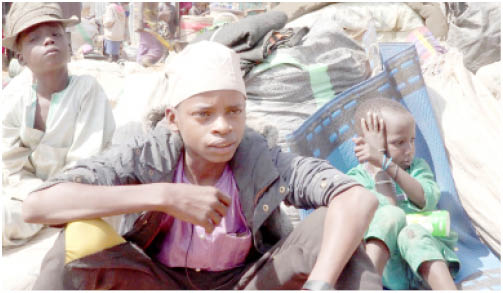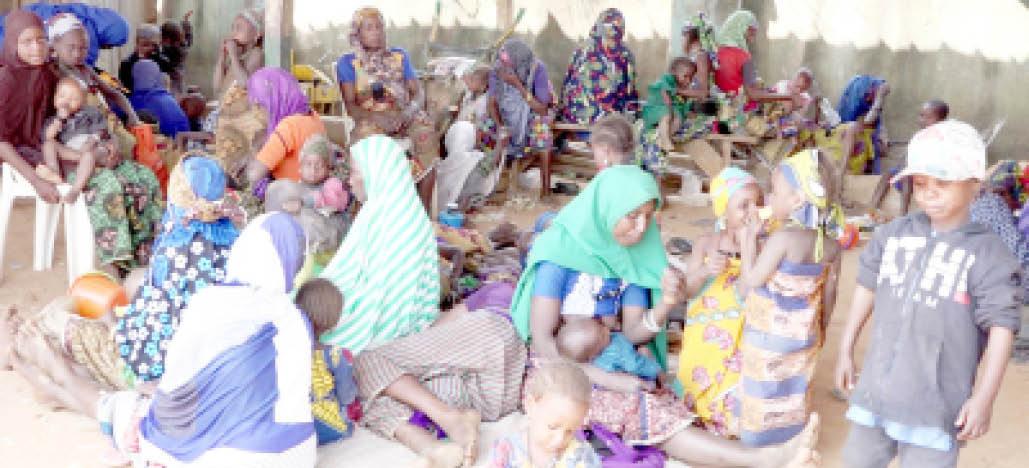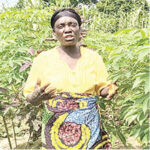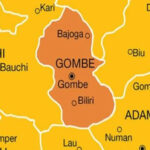Children crying, women distraught and men angry were the images at the Mararaba motor park in Nasarawa State, near the Federal Capital Territory (FCT), where over 100 Fulani temporarily camped after they fled Taraba State.
They claimed they were victims of repeated onslaughts by men they alleged were state government-sponsored vigilante groups, who killed some of them and chased others out of their community.
Sleeping in open spaces under harsh weather conditions, one of the victims, Usman Dan Usman, narrated their harrowing experience to Daily Trust Saturday, saying, “No cattle, no goat, and here, we are being chased like chicken. For God’s sake, are we not Nigerians?”
Usman alleged amidst tears that their attackers did not spare anything after an unofficial quit notice that started as rumour.
Katsina communities count losses after clash with bandits
Bandits’ attack: Death toll rises to 84 in Katsina
“We thought it was a joke as our village head did not notify us of anything. We thought that nothing would happen to us. But suddenly, we saw them and they followed us to our houses, killing and confiscating our cattle and chickens.
“They killed children and the elderly. We don’t know our offence. If someone has committed a crime, that person should be identified and be brought to book,” he added.
Taraba State has faced decades of ethno-religious and communal crises that have claimed many lives. From the Tiv-Jukun crisis to the Jukun-Fulani crisis, as well as farmer-herder crisis, thousands have been displaced from their communities.
Umar Babuga, a teenager, said members of the vigilante group attacked them on a field and confiscated over 200 cattle. Babuga, who is still searching for his elder brother, said he was afraid that his brother may have been killed.
He said, “That morning, we took our livestock to drink water when the vigilantes came on motorcycles and some on foot, shooting towards our direction.
“They confiscated our cattle. We fled, but our elder brother could not run. They took everything and him as well. While we were running, we heard gunshots and presumed they may have killed him. We searched for him but couldn’t find him. There was no trace of his remains.”
When contacted, the Taraba State police command said it did not have any report that the Fulani in the state were attacked and forced to flee their homes.
The police public relations officer in the state, Usman Abdullahi said, “The command is not aware that some Fulani residents have been attacked and chased out of their houses and forced to relocate to the FCT.”
But motor parks in Jalingo, the Taraba State capital, paint a contrary picture. Our correspondent reports that more Fulani women, children and the elderly have been camped in open spaces, awaiting their exit from the state.

While there are victims of attacks at the Mararaba motor park, not everyone who fled Taraba State was directly affected.
Umaru Abubakar from Gayam in Gashaka Local Government Area said the excesses of the vigilantes had inflicted fear on him and members of his family, forcing them to flee.
“We fled because of horrific news from neighbouring communities, such as Jatau in Bali Local Government Area.
“We are peaceful; nobody has ever caught us on someone’s property, but these people are tracking our villages, killing our people and setting our houses on fire,” Abubakar said, adding that even those who had lived in the community for over 20 years were forced to flee.
“The massacre started in the Jatau area of Bali Local Government Area. Animals were rustled in Jatau, farm produce catered away and others burnt. Seeing this scared us, so we fled,” Muhammadu Ibrahim said, adding that he was forced to flee with his family.
Victims of the attacks also claimed that they noticed a pattern of repeated attacks at Fulani communities populated by herders from the Sullubawa clan. They are also referred to Bokolo Fulani. They claimed that the attacks on Bali and Gashaka communities had been selective.
Speaking on how members of the vigilante group are able to identify those from the Sullubawa clan, Umar Abubakar, one of the victims, said they were identified by their cattle.
“The Sullubawa keep Bokolo known as the Sokoto Gudali, while the Bororo keep long-horned cattle, known as the red Fulani,” he said.
Speaking to Daily Trust Saturday, the Taraba State vice chairman of the Miyetti Allah Cattle Breeders Association of Nigeria (MACBAN), Baba Suleiman, said the crisis started from Gasol Local Government Area around April 2022
“Alleged cases of kidnapping in the Gasol area by the Bokolo Fulani clan triggered the crises,” he said, adding that indigenous communities in some parts of Taraba State had “gathered their vigilante groups or hunters and went after them and confiscated their cattle.”
Suleiman, however, said the leadership of the MACBAN had conveyed a meeting with local chiefs in the area and urged them to put an end to attacks on the Fulani so that innocent ones would not be harmed.
He said the MACBAN and other Fulani associations had met with the state government and urged them to tackle the situation with seriousness.
“After our discussions with government officials, we can say that the problem is abating,” he said.
We received over 30 buses of Fulani from Taraba – NURTW
The National Union of Road Transport Workers (NURTW) at the Mararaba motor park told our correspondent that over 30 buses loaded with Fulani women, children and the elderly arrived at the facility from Taraba State.
The chairman of the union in Nasarawa State, Salihu Adamu, said they had assisted the stranded victims with food and buses to ensure they moved to other parts of the country.
“Our resources have depleted due to the increasing number of victims trooping in on a daily basis. At the moment, we give our support, we sometimes help in feeding them, but it is a burden on us because we also have families,” Adamu added.
When Daily Trust Saturday contacted the Nasarawa State Emergency Management Agency on assistance to the displaced persons, the executive secretary of the agency, Zakari Alumaga, a lawyer, said the matter had not been reported by the Karu Local Government, where the Mararaba motor park is located.
Attempts by our correspondent to get the reaction of the chairman of Karu Local Government, James Thomas, were not successful as he did not respond to calls and messages.
Fulani have right of movement, association – HURIWA
Section 41 of the Nigerian 1999 Constitution (amended) grants every Nigerian the right to move freely and reside in any part of the country. The section states that no citizen of the country shall be expelled or refused entry.
Speaking to Daily Trust Saturday the national coordinator of the Human Rights Writers Association of Nigeria (HURIWA), Emmanuel Onwubiko, clarified that every Nigerian was entitled to freedom of movement and association as long as the individual is law abiding.
“The only time your right is limited is when you commit an offence. It is the responsibility of the government to protect the lives and property of all citizens,” Onwubiko said, and called for an all-inclusive government to represent the diversity of the states in order to promote a peaceful society.
Vigilantes operate under security surveillance – Taraba government
The Taraba State Government has dismissed the allegations of the fleeing Fulani, saying it is “a mischievous interpretation of the current security challenges.”
The commissioner for information and orientation in the state, Lois Emmanuel, said available information to the government indicated that cattle rustlers from neighbouring Cameroon invaded several communities in the area threatening lives and property.
“Naturally, this development has attracted resistance from locals. It is, therefore, not an inter-ethnic or intra-ethnic rivalry or clashes as some people portray it.
“It is for this reason that the involvement of vigilantes is under the strict supervision of security agencies. They are not allowed to operate alone so that they will not take laws into their hands,” he said.

 Join Daily Trust WhatsApp Community For Quick Access To News and Happenings Around You.
Join Daily Trust WhatsApp Community For Quick Access To News and Happenings Around You.

